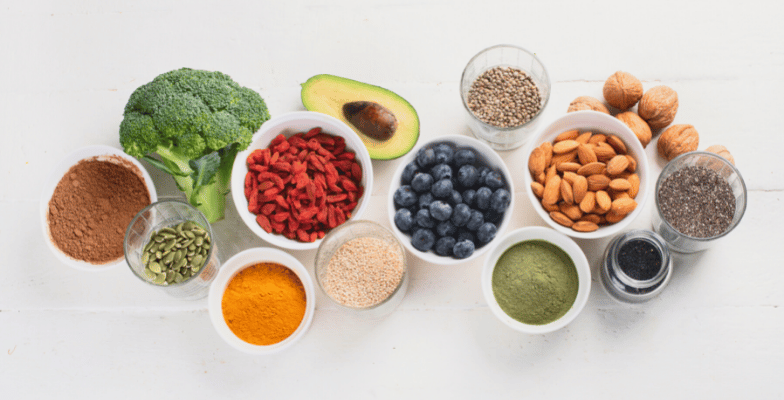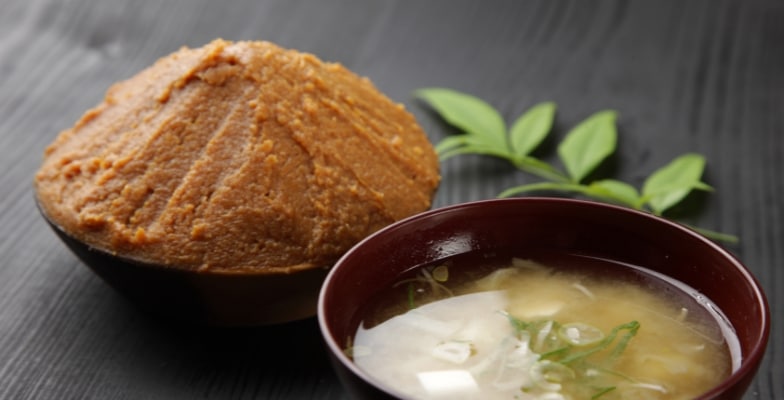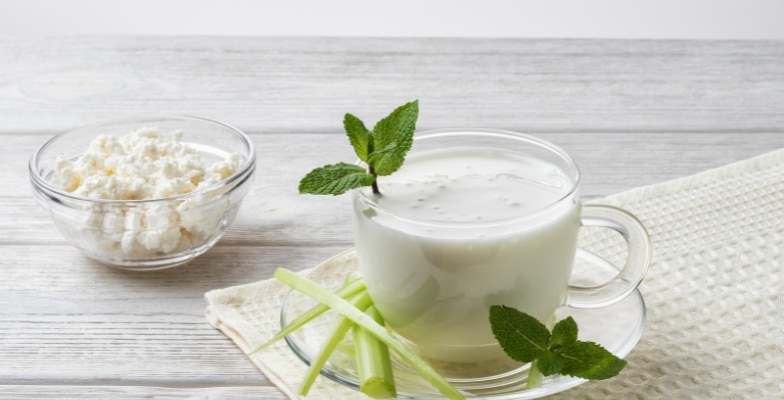Top 10 Superfoods: Top Ten Best Foods for You

Here are the Top ten best superfoods that I include in my diet everyday are (with scientific references):
Note: I will not list any exotic superfoods that are expensive and hard to procure.
Ghee
Ghee is formulated when you heat butter and remove milk solids and water. It has a high heating point which makes ghee very stable at high temperatures. Ghee has been the mainstay in my household for generations. A few hundred calories from ghee are something we eat without blinking an eye. Haha…
Ghee and other sources of saturated fat have been unfairly demonized in the past few decades in favor of processed vegetable oils. Let me make it clear. I consider myself an educator and not an enforcer.
I strongly believe in what I say and present. I feel fat sources such as whole eggs, grass-fed whole milk, coconut oil and ghee are awesome and very important for one’s health, and I do provide relevant studies to support my claim.
Related Article: Saturated Fat: Good Or Bad?
I belong to the Northern part of India, where ghee and other sources of saturated fats are literally consumed in kilos and are actually considered very sacred. In fact, if you go to any temple, any aarti or pooja done for God, ghee is the mainstay ingredient in the whole process.
I strongly urge you to go through the article I have linked up, do your own research and make your own decisions. With that thought, let’s understand the key nutrients in ghee.
Related Article: Is Ghee Good For Health?
CLA- Conjugated Linoleic Acid, a fatty acid associated with a long list of health benefits. Some studies have found that CLA may be effective in reducing body fat, preventing cancer formation, alleviating inflammation and even lowering blood pressure. 1https://www.ncbi.nlm.nih.gov/pubmed/15159244, 2https://www.ncbi.nlm.nih.gov/pubmed/15941017
Butyric acid short-chain triglycerides are important for gut health and reduce inflammation and are also abundantly found in ghee. 3https://www.ncbi.nlm.nih.gov/pmc/articles/PMC4816278/, 4https://www.ncbi.nlm.nih.gov/pmc/articles/PMC3099420/ The best way to include is to start using it as a cooking oil. (and by throwing away all the highly refined vegetable oils)
Whole Eggs
I still remember the times, more than 10 years back, when I used to eat just egg white…and throw away the yolk…what a waste! It is unfortunate that the most nutritious part is still demonized. Due to the cholesterol issue.
Egg yolk does raise cholesterol, but good cholesterol is HDL, not LDL. HDL is good cholesterol. I have linked up an article about eating eggs, how many you can eat in a day and the science behind cholesterol and eggs.
Related Article: Is Egg Good For Health? | How Many Eggs Can I Eat In A Day?
Here we will only focus on the nutrition and benefits of this amazing food that I have been eating almost every day for breakfast for decades now. A whole egg is loaded with vitamin A, folate, vitamin b2, b12, phosphorus, selenium and choline. 5https://www.ncbi.nlm.nih.gov/pmc/articles/PMC2782876/
Choline is used to build cell membranes and has a role in producing signaling molecules in the brain, along with various other functions. Just like spinach and broccoli, whole eggs contain lutein and zeaxanthin antioxidants that have major eye health benefits. 6https://www.ncbi.nlm.nih.gov/pubmed/9286269
-Eggs are also high in vitamin A, which is important for eye health.
-Eggs can also help in the muscle building as one single whole egg has roughly 6g of complete protein (all 8 essential amino acids that our bodies cannot manufacture on their own).
-Eggs have 5 grams of healthy fats that can keep anyone full for the longest period of time.
And trust me when I say this…the biggest win for you when your clients are trying to lose weight is when their blood sugar is stabilized…that means no cravings and no hunger; enough protein and healthy fats can absolutely help with that. Make sure to check out the articles I have linked up.
Eggs can be eaten whenever, ideally, start your morning with eggs…boiled, sunny side up, or omelet. Eat them however you like:)
Raw Cow’s Milk
There is a special reason why I use the word ‘raw.’ Raw milk means unpasteurized and unhomogenized. I have been drinking raw cow’s milk since I was a baby. My son, who is 8 years old now, has been fed raw cow’s milk since he was 1 year old.
My parents, their parents, and generations before them have thrived on raw cow’s milk and sometimes buffalo milk; however, the latter is not widespread in other parts of the world, just India. Like whole eggs and other food sources of saturated fats, raw milk has been considered dangerous. Which I believe is not true.
I have linked up an article, read it and see it for yourself. 7https://draxe.com/raw-milk-benefits/
Let’s look at the nutrient profile of raw cow’s milk.
-Raw milk contains important minerals like
Magnesium
Potassium
Calcium
-It also has high-quality protein that helps in building muscle.
-It’s through milk that you can make products like yogurt and kefir, which are very high in probiotics that help optimize your gut bacteria. Probiotics can be very helpful for colon cancer, IBS and other intestinal infections.
-Raw cow’s milk contains fat-soluble vitamins A, D and K2. These vitamins support brain health and nervous system development.
-Raw milk is also packed with CLA, butyric acid (which are also found in ghee/coconut oil)
-Again, don’t take my word for it, do your own research…people drinking raw milk are thriving. Don’t let conventional wisdom misguide you.
Coconut Oil
There are over 1500 studies proving that coconut oil is one of the healthiest foods on the planet. Just go to Home-PubMed-NCBI and type coconut oil, and you will get the list of all studies. 8https://pubmed.ncbi.nlm.nih.gov/
So let’s discuss the nutrients in coconut oil that makes it one of the healthiest food on the planet. Most of the fats that we consume take longer to digest; we all know that.
Related Article: Coconut Oil Good Or Bad?
But Medium Chain Triglycerides found in coconut oil provide the perfect source of energy because they only have to go through a 3-step process to be turned into fuel, whereas other fats have to go through a 26-step process.
The three medium-chain triglycerides that coconut oil has been-
Caprylic acid
Lauric acid
Capric acid
-50% of coconut oil is mainly lauric acid which is antimicrobial antiviral, antibacterial, and antiprotozoal and can kill pathogens like bacteria, viruses and fungi. This surely gives your immune system a solid boost, especially if you suffer from frequent colds and flu.
-Coconut oil also promotes healthy brain function.
-Researchers found that ketones work as an alternating energy source for malfunctioning brain cells, which has been found to reduce symptoms in Alzheimer’s patients. 9https://www.ncbi.nlm.nih.gov/pmc/articles/PMC4937039/
-Coconut oil can also help you lose fat and reduce weight. Healthy fats help you to keep full for a longer period of time. It helps you stabilize your blood sugar levels which further helps you minimize cravings.
Besides studies, I want to point out some anecdotal evidence that further strengthens the fact that coconut oil is indeed a super-duper food! Several populations around the world have thrived for multiple generations around the world eating a large number of calories from coconut oil.
The best example of such a population is the Tokelauans, who live in the south pacific. They used to eat over 60% of their calories from coconuts. When studied, they were found to be in excellent health with a low rate of heart disease.
Another example of a population that ate a large number of calories from coconut is the Kitavans. There are many benefits of coconut oil, and it has nothing to do with eating. You can apply coconut oil to your skin and hair.
You can even rinse your mouth with it every day for 5 minutes, as I do. This can kill harmful bacteria in your mouth. Coconut oil easily constitutes 200-300 of my daily calories for many years, and I am in the best of my health. (this is on days when I don’t consume ghee.
So it’s either coconut oil or ghee; I usually alternate between these cooking oils.
Walnuts
Walnuts are the King of nuts. Just one-quarter cup of walnuts provides 100% of the daily recommended allowance of plant-based omega-3 [ALA], copper, manganese, molybdenum, biotin, Vitamin E, and folate.
Studies on the health effects of eating walnuts are very promising. Eating just 4 walnuts a day has been shown to increase the blood level of heart-healthy ALA significantly.
Another research shows that just one ounce [28g] of walnuts a day may decrease cardiovascular risk. Walnuts contain the amino acid L-arginine, which offers multiple vascular benefits to people with heart disease or those who have an increased risk of heart disease due to multiple cardiac risk factors. 10https://www.ncbi.nlm.nih.gov/pmc/articles/PMC5762129/
In another study on mice, the human equivalent of just 2 handfuls of walnuts a day can cut breast cancer risk in half and slow tumor growth by 50% as well. 11https://www.ncbi.nlm.nih.gov/pmc/articles/PMC3952627/
Walnuts contain nutrients like folate, Vitamin E and ALA and can support brain health, reduce oxidative stress and overall reduce cardiovascular risk. The best way to add walnuts to your diet is to eat them as a snack. If you also eat oats in the morning, you can sprinkle a few walnuts in it.
Related Article: Benefits Of Walnuts | How Many Walnuts Should You Eat Per Day?
Turmeric
Turmeric contains anti-inflammatory, antioxidant curcumin, which is often called Indian Solid Gold. According to Bharat B. Aggarwal Young-Joon Surh, S. Shishodia authors of The Molecular Targets and Therapeutic Uses of Curcumin in Health and Disease,
“Curcumin has shown to exhibit antioxidant, anti-inflammatory, antiviral, antibacterial, anti-fungal, and anticancer activities and thus has a potential against various malignant diseases, diabetes, allergies, arthritis, Alzheimer’s disease, and other chronic illnesses.”
A study also shows that a bioactive compound in turmeric called aromatic-turmerone can increase neural stem cell growth in the brain by as much as 80 percent at certain concentrations.
How to add turmeric to your diet
-Smoothie
-Milk
-Curry
-Golden Milk
Spinach
Spinach is very similar to broccoli in terms of its nutrients and health benefits. Like broccoli, it has vitamins A, C, and K, iron, calcium, fiber and folic acid. Spinach is loaded with antioxidants which help reduce oxidative stress due to free radicals.
Free radicals are byproducts of metabolism. They can cause oxidative stress, which triggers accelerated aging. This also increases the risk of cancer and diabetes. 12https://www.ncbi.nlm.nih.gov/pubmed/12111045
Spinach contains high amounts of zeaxanthin and lutein, which are the carotenoids responsible for color in some vegetables. 13https://www.ncbi.nlm.nih.gov/pubmed/17652276, 14https://www.ncbi.nlm.nih.gov/pubmed/9367061 Several human studies link spinach consumption to a reduced risk of prostate cancer. Eating this leafy green may also help prevent breast cancer, and just like broccoli, have it with your eggs and chicken and always do add a few spinach leaves when eating your salad.
Related Article: Spinach Nutrition Facts And Health Benefits
Broccoli
Broccoli is a mainstay green vegetable in my diet almost every single day.
Look at all the real-life pictures of the meals that I keep clicking….broccoli is present every time.
I sauté it in coconut oil, and sometimes I boil it. 90% of the time, I have it with eggs…and request the restaurant where I have ordered chicken to include broccoli as part of the vegetable. Let’s talk about the nutrients that make this vegetable a superfood.
-Broccoli is loaded with Vitamin c, k, iron and fiber.
-Broccoli contains several unique anti-oxidants and compounds that can aid in clearing excessive estrogen (which encourages higher testosterone levels and increases muscle growth) and toxins from the body not limited to fighting cancer.
-Broccoli has a compound called Sulforaphane. which helps fight cancer. 15https://www.ncbi.nlm.nih.gov/pubmed/22578879, 16https://www.ncbi.nlm.nih.gov/pubmed/23110644
-Broccoli also helps in reducing blood pressure
-Broccoli contains beta-carotene, which is converted into vitamin A in the body, which, if you can recall from your diploma in a nutrition course, can help improve eye health.
The best way to include broccoli is to eat it with your breakfast. Get it done in the morning, your willpower is highest in the morning, and if you can eat a big bowl of green salad with your breakfast, then you are under no pressure other meals to eat these superfoods…
Related Article: Health Benefits And Nutritional Value Of Broccoli
Lentils
Lentils are the best source of proteins for vegetarians and vegans. One large bowl gives close to 17g of high-quality protein. Lentils, commonly known as daal in India, have been around for thousands of years. Some of the most common variations include black, green and red varieties.
They lower the risk of cardiovascular disease. Lentils contain fiber and folate. Studies suggest that eating high-fiber foods helps decrease the risk of heart disease, while magnesium helps regulate blood circulation. 17https://www.mindbodygreen.com/0-5488/7-Health-Benefits-of-Lentils.html
-Lentils also slow the rate of digestion and sugar absorption. The high fiber content of lentils helps slow down the rate of digestion. This leads to the slower absorption of glucose, helping regulate blood sugar levels.
-Lentils may help in the prevention of birth defects in pregnant women. Lentils contain high amounts of folate, a mineral necessary for preventing neural tube defects in unborn babies. Insufficient folate intake often causes spinal cord defects and may even lead to brain development problems. 18https://www.babycenter.com/0_folic-acid-why-you-need-it-before-and-during-pregnancy_476.bc
-Aids in weight loss.
-Lentils are low in calories, filling and nutrient-dense. This means that one serving of lentils usually prolongs the period before hunger sets in again, limiting or decreasing the calories that you take in throughout the day. 19https://www.medicalnewstoday.com/articles/297638.php
And lastly,
Kidney Beans
Vegans and vegetarian, kidney beans is one of the best sources of proteins for you. In India, we call kidney beans rajma, and a combination of rice and rajma is one of the most common street dishes available in India, and it’s super tasty too!
Not only are kidney beans cheap, but they are also loaded with high-quality proteins, complex carbs and very less fat. You’ll be like; finally, Akash is discussing something with less fat…haha… let’s talk in more detail…
Kidney beans are loaded with nutrients such as fiber, folate, iron, manganese, copper, and phosphorus…
Due to their fiber content, kidney beans can lower insulin and fasting blood sugar levels and controls blood sugar. This also aids in weight loss. Kidney beans lower cholesterol and reduce the risk of heart disease by lowering LDL cholesterol and decreasing inflammation. 20https://www.ncbi.nlm.nih.gov/pmc/articles/PMC2888631/
The best way to include them in your diet is by learning new recipes… and another tip is this one is to eat them out of cans… just select a brand that has the lowest sodium levels. The majority of you are not great cooks and have little time.
When you choose pre-cooked kidney beans in cans, you are opting for something which can be prepared in less than 10 minutes. To further reduce the sodium content…just drain the liquid it comes with.
Related Article: Bean: The Complete Guide | Protein Content In Bean
Let us know what you think about this article in the comments section below!

Skill-Based Education.
Global Recognition.
Powerful Community Building
Secure a certificate of completion in as little as a day by graduating from one of our free courses.
Get Access to Our Free Courses. No Credit Card Required.

Fabulous Body Membership
Your All-Access Pass to A Fabulous Body & A Rewarding Career
25+ Certificate Courses & Programs, All Included
15 Day Free Trial, 100% Money-Back Guarantee
About Akash Sehrawat
Akash is a creator of 25+ programs and certificate courses in which more than 200,000 students have enrolled both on Udemy and Fabulous Body's native platform. Akash is also an author of three books that can be found on Amazon. His answers on Quora have gathered more than 12 million views in less than a year.










